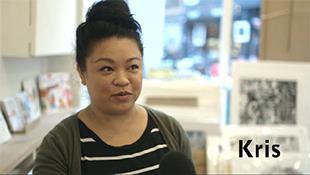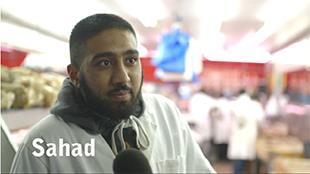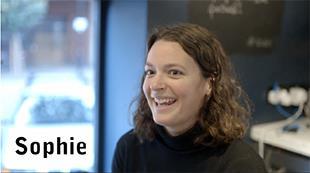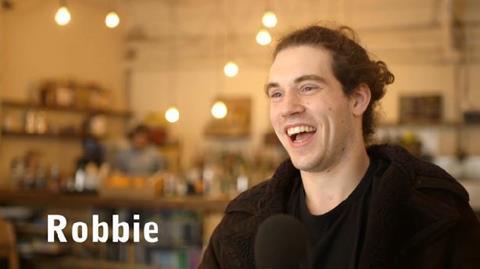Set in Brixton, London, this video lesson includes authentic interviews with people living in London talking about alternative lives.
Seven ideas on how to use this video with your class
The following lesson ideas can be used alongside the video Live from London: Double identity. You can use these ideas on their own, you could group some of the activities together and choose to do them in whichever order you prefer. Each lesson idea has a recommended learner level. The transcript is attached under ‘Downloads’ at the bottom of this page.
If you’re teaching teens, you can use these videos alongside the series Impressions. This video can be used with the lesson plan ‘Double Identity’.
Some of the ideas can be used for flipped lessons. In this scenario students can do tasks and preparatory work at home or in the school independently from the teacher for the following lesson. This allows more time for communicative tasks, teacher-led tasks or group-led tasks during class time.
1. Dream profile

Level: Pre-intermediate (A2) to upper intermediate (B2)
Summary: Students use the theme of the video to create a dream profile of themselves.
Objective: to engage students; to promote speaking and imagination
Instructions: Write the following phrases on the board:
Dream job
Ask your student to tick the phrases discussed in the video.
Answers:
Dream job, Dream identity, Dream place to live
Now ask your students to make notes on their dream profile. Place your students in pairs to share their dream profiles. Encourage students to ask why and further questions to gain more information.
Finally, create new pairs and ask them to describe the dream profiles of their previous partner to each other.
2. Themed discussion
Level: Pre-intermediate (A2) to upper intermediate (B2)
Summary:
Objective: to practise question forming; to encourage discussion; to revise the second conditional
Instructions: Place your students into pairs or small groups for this activity. Before playing the video, tell your students that Luke, the interviewer in the video, asks three main questions. Ask your students to write down the three questions they hear (see below). Play the video.
Answers:
If you could choose to be somebody else, who would you be?
If you could do any job, what would it be?
If you could live anywhere in the world, where would you live?
Play the video for a second time and ask your students to note down the answers given by each person in the video. Ask your students to compare their answers in groups and then feedback as a class.
Now ask students to ask and answer the questions giving their own opinions/answers in pairs or small groups. You could include a focus on the second conditional and follow this second conditional lesson.
3. Back to screen
Level: Pre-intermediate (A2) to upper intermediate (B2)
Summary: Half the class watch the video whilst the other half sit with their backs to the screen. The students who can see the screen describe what is happening.
Objective: to engage students; to promote speaking, imagination and predicting skills, to practise modal verbs
Instructions: Divide students into pairs. Student A turns their seat away from the screen and student B watches the screen.
Student B explains what is happening to student A whilst watching the video with no sound.
Student B has to use the visual prompts such as the montage (the opening scenes) and the expressions and mannerisms of the people in the video to make predictions regarding what the video is about and what the people in the video are saying.
Now create new pairs of student A and student B. With their new partner student A explains what they were told happened in the video.
Compare predictions with the actual video as a whole class.
4. True or false

Level: Pre-intermediate (A2) to intermediate (B1)
Summary: Students are given a list of true or false statements about the video content
Objective: to listen for specific information
Flipped: Students can do this activity at home as well as prepare their own true and false statements for use in the following class. You could then add the ‘Interview task’ activity to be completed in the rest of the lesson.
Instructions: Look at the statements below. Some are true and others are false. You can write them on the board, create your own handout or use the editable worksheet (see below under ‘related resources’). You may wish to change the order of the statements to make it more challenging or using the transcript you may wish to make your own true/false statements.
Statements and answers
Sophie would like to be Miley Cyrus [T]
Robbie wasn’t interested in cowboys when he was younger [F] He was really into cowboys when he was young
Kris would like to be Coco Chanel [T]
Sahad would like to be Robert De Niro [F] He’d like to be Al Pacino
Natasha would like to wear one of Michelle Obama’s fantastic dresses [T]
Robbie would like to run his own bar in Australia [F] In New Zealand
Kris is an architect when she’s not working in the shop part time [F] She’s an artist
Sahad still boxes regularly [F] He used to box regularly
Sophie would like to live in India one day [T]
Kris would have a place in London, New York and in the mountains [F] She would have a place in London, New York and on the beach
Additional idea: ask your students to write their own true and false statements to swap with a partner about who they’d like to be, their dream job and where they’d like to live.
5. Mini-presentation

Level: Pre-intermediate (A2) to upper intermediate (B2)
Summary: Students choose a famous person they would like to be to present to the class.
Flipped: Your students can research and prepare their presentations outside of class for homework
Objective: to practise presentation skills; to provide fluency practice
Instructions: Explain to your students that Luke, the presenter in the video, asks three questions but they are going to focus on the first question - if you could choose to be someone else, who would you be?
Write the following people on the board:
Jesse James
In small groups ask your students to discuss who these people are and what they already know about them. Explain to your students that they are going to watch the video and match each person to the interviewee who mentions them in the video. Now ask your students to choose a famous person they’d like to be. For homework they can research their chosen person to present to the class the following day.
6. Vocabulary lesson

Level: Intermediate (B1) to upper intermediate (B2)
Summary: Students familiarise themselves with some more advanced language in the video.
Objective: to build vocabulary; to practise speaking; to induce meaning from context.
Instructions: Write the below words and expressions on the board or print out the editable worksheet (see below under ’related resources’)
1. lifestyle
Explain to your students that these words and expressions are in the video. As they listen they have to consider what they mean in context. Play the video and then place your students in groups to see if they can come up with a definition for the new language. If they are still struggling put the following definitions on the board:
a. excellent
Students match each definition to the correct word.
Answers: 1.f 2.d 3.b 4.c 5.a 6.e
Then write the following questions on the board or dictate them to your students and ask them to discuss them in small groups:
What kind of lifestyle would you like?
What are you currently really into?
Is there someone from your country you consider pioneering?
What do you thoroughly enjoy about learning English?
What is wicked about your life?
What makes you feel chilled out?
7. Imagination task
Level: Pre-intermediate (A2) to upper intermediate (B2)
Summary: Students work in pairs and try to imagine additional information about the people in the video.
Objectives: to practise interviewing, listening and note-taking
Flipped: This could be set up as homework
Instructions:
Sophie, Robbie, Kris, Natasha, Sahad
Now ask your students to work in pairs to use their imagination to predict additional information about each person and offer justifications for their answers. They could use the following questions as guidance for thinking about additonal information. As their teacher you could also make your own predictions.
For example: Sophie likes reading celebrity magazines and likes pop music as she mentions she’d like to be Miley Cyrus (the American pop star)
How old are they?
Are they single or married?
Where are they from? What’s their background?
What’s their job?
Do they like their job?
How do they spend their free time?
What kind of music do they listen to?
What kind of films do they like?
Conduct whole class feedback allowing your students to share their ideas and see what agreements and disagreements arise. There are no right or wrong answers for this exercise as the aim of this exercise is to practise making predictions, rather than getting the right answers.
Downloads
Click link to download and view these filesLive from London: Double identity — Worksheet
Word, Size 0.12 mbLive from London: Double identity — Video
Video, Size 52.77 mbLive from London: Double identity — Transcript
Word, Size 0.12 mb
Credits
Topics
- Adults
- B1
- B2
- British English
- C1
- Celebrations / Holidays / Festivals
- Clothes
- Crafts & Projects
- Culture
- Drink
- Economics
- Education
- ESP
- Facts
- Festivals
- Film & TV
- Food
- Geography & Places
- Health & Well-being
- History
- Integrated Skills
- Intermediate
- Leisure
- Listening
- Mixed Ability
- Nature
- People & Individuals
- Politics
- Pre-Intermediate
- Science
- Shopping
- Social Media
- Sport
- Technology
- Teenagers
- Travel
- Up to 45 mins
- Up to 60 mins
- Upper-Intermediate
- Video
Live from … authentic video lessons
- 1
- 2
- 3
- 4
- 5
- 6
- 7
- 8
- 9
- 10
- 11Currently reading
Live from London: Double identity
- 12
- 13
- 14













No comments yet